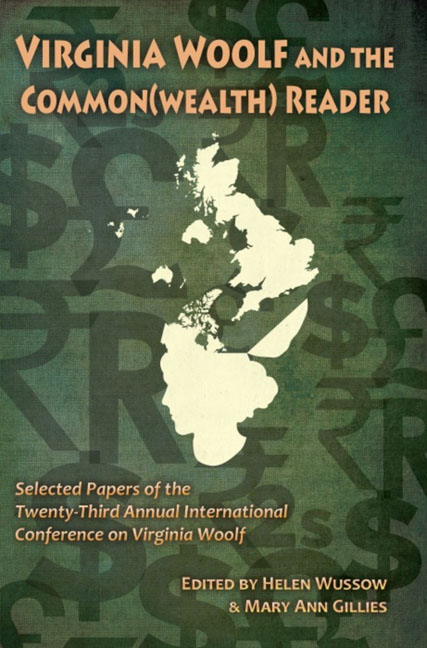Book contents
- Frontmatter
- Contents
- Introduction to Virginia Woolf and the Common(wealth) Reader
- Acknowledgments
- List of Abbreviations
- Invocations
- Networks of Affiliation: Foundations and Friends
- Woolf and the Commonwealth
- “Simplicity and art shades reign supreme”: Costume, Collectibles, and Aspiration in Katherine Mansfield's New Zealand
- Wealth in Common: Gifts, Desire, and Colonial Commodities in Woolf and Mansfield
- On a View from the Rims: Katherine Mansfield and Emily Carr
- London Calling: Una Marson in the Colonial London Scene
- Modernism Across the Commonwealth: Virginia Woolf's and Arundhati Roy's Critique of Empire
- From Bloomsbury to Fountain Lakes: An Australian Virginia Woolf
- 1930s Onwards
- Woolf Beyond the Book
- Notes on Contributors
- Conference Program
Modernism Across the Commonwealth: Virginia Woolf's and Arundhati Roy's Critique of Empire
from Woolf and the Commonwealth
- Frontmatter
- Contents
- Introduction to Virginia Woolf and the Common(wealth) Reader
- Acknowledgments
- List of Abbreviations
- Invocations
- Networks of Affiliation: Foundations and Friends
- Woolf and the Commonwealth
- “Simplicity and art shades reign supreme”: Costume, Collectibles, and Aspiration in Katherine Mansfield's New Zealand
- Wealth in Common: Gifts, Desire, and Colonial Commodities in Woolf and Mansfield
- On a View from the Rims: Katherine Mansfield and Emily Carr
- London Calling: Una Marson in the Colonial London Scene
- Modernism Across the Commonwealth: Virginia Woolf's and Arundhati Roy's Critique of Empire
- From Bloomsbury to Fountain Lakes: An Australian Virginia Woolf
- 1930s Onwards
- Woolf Beyond the Book
- Notes on Contributors
- Conference Program
Summary
The political dimensions of Virginia Woolf's writing continue to incite critical interest and debates. Quentin Bell's claim that Woolf's place in “the Victorian world of Empire, Class and Privilege” made her fiction apolitical (186) has been contested at least since Jane Marcus's polemical responses to Bell in Art and Anger. Since the early 1990s, critics have explored Woolf's anti-imperial stance in texts such as “Thunder at Wembley” and Three Guineas as well as her major novels. In Virginia Woolf Against Empire, Kathy Phillips highlights Virginia and Leonard Woolf's critique of the violence sustaining British imperialism. For Phillips, Virginia Woolf's novels were shaped by her exchanges with Leonard Woolf around his political work towards decolonization. In 1992, two years before Phillips's book, Marcus's ground-breaking essay “Britannia Rules The Waves ” challenged a long tradition of reading Woolf's most experimental novel as disconnected from political concerns; The Waves, as Marcus shows, furthers an anti-imperial politics.
Two decades later, it is time to ask: how does Woolf's modernist poetics and its critique of imperialism resonate with twentieth-century postcolonial literary production across the British Commonwealth? The proliferation of “the new modernist studies” since “on or about 1999” (Mao and Walkowitz 737) has enabled ways of re-thinking the relationship between trans-Atlantic high modernism and postcolonial literature worldwide. Scholars like Simon Gikandi and Susan Stanford Friedman (“Periodizing”) have recently called for a more inclusive definition of the term “modernism” that would encompass the globe and stretch beyond the limited time period conventionally associated with literary modernism. Such a definitional expansion views modernism as a transnational and transhistorical phenomenon; modernist practices might emerge from multiple geocultural centres in dialogue with one another, rather than being confined to European modernist appropriations of colonial cultural forms. This dialogue allows for an alternative understanding of modernist internationalism, and critics such as Walkowitz and Jessica Berman have traced a critical cosmopolitanism in Western as well as non-Western modernist writing that interrogates the structures of empire and the nation-state.
I read Woolf's The Waves in conjunction with Arundhati Roy's The God of Small Things in order to highlight the critique against imperialism that emerges through the two writers’ strikingly similar political ideas and aesthetic strategies.
- Type
- Chapter
- Information
- Virginia Woolf and the Common(wealth) Reader , pp. 115 - 120Publisher: Liverpool University PressPrint publication year: 2014

